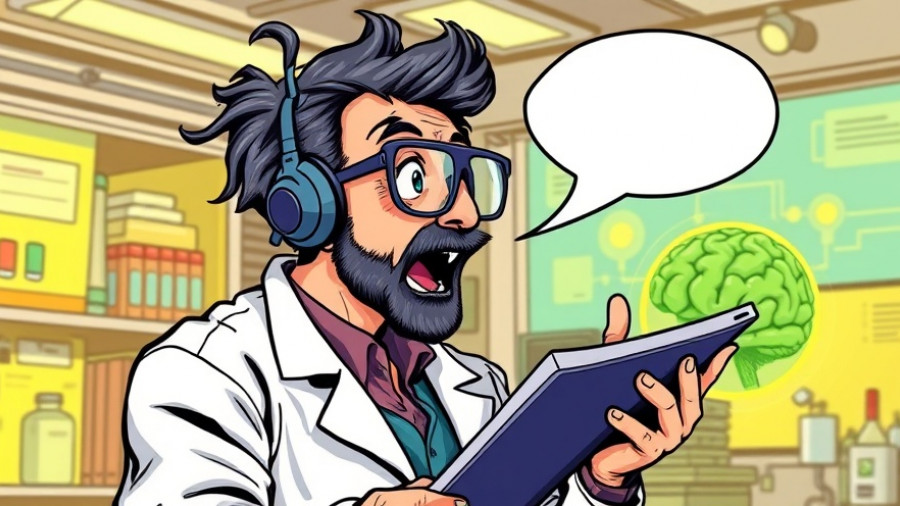
AI Breakthroughs: The Dawn of Cancer Treatment Innovations
In a fascinating turn of events, the intersection of artificial intelligence (AI) and cancer research has sparked renewed hope. Recent announcements from tech giant Google reveal that their AI model, C2Scale, has generated a novel hypothesis concerning cancer cellular behavior, which has already been validated experimentally. This groundbreaking discovery raises questions about the future potential of AI in medical advancements as it embarks on the journey of fighting one of humanity's most resilient adversaries: cancer.
In 'Maybe AI Will Cure Cancer After All,' the discussion dives into how AI advancements are addressing cancer research, exploring key insights that sparked deeper analysis on our end.
Understanding the C2Scale Breakthrough: A Game Changer
Google's announcement highlighted a significant challenge in cancer therapy, namely the "cold" tumors that evade the immune system's detection. As a part of its approach, the C2Scale model was tasked with finding drug candidates that could serve as conditional amplifiers. This unique requirement allowed it to screen over 4,000 drugs and identify new candidates that had not been linked to cancer treatment in prior literature.
The implications of this are profound. AI's capability to process massive datasets far surpasses what human researchers can accomplish. The model didn't merely replicate existing knowledge but forged new territory in generating hypotheses that led to successful experimental results. This isn’t just a theoretical exercise but a promising pathway toward innovative therapies.
Why AI in Science Matters
One pivotal insight is the role that AI plays in enhancing scientific reasoning, specifically in domains that require extensive experimentation. The rise of AI-powered tools like C2Scale signals a paradigm shift in the development of therapies aimed at diseases like cancer, which have stumped researchers for decades. By utilizing AI, scientists can accelerate discovery processes, potentially reducing the time and resources required to find viable treatments.
Embracing Change: How Businesses Can Leverage AI Innovations
For business owners, the implications of AI advancements extend beyond healthcare. This represents an opportunity to sidestep traditional bottlenecks associated with research and development. Many industries can now harness AI technologies to uncover new insights, streamline operations, and enhance efficiency. Whether in pharmaceuticals, health tech, or any data-driven sector, the advancements highlighted by Google's finding can direct business strategies toward future-proofing their organizations.
Critiques and Realities: Balancing Optimism with Skepticism
Although the breakthrough has generated enthusiasm, it hasn't been free of skepticism. Critics have argued that equipping AI technologies to perform novel scientific discovery is a stretch. However, as scientific understanding evolves, it is crucial to acknowledge that scientific discoveries often build upon previous knowledge. AI models are now capable of synthesizing existing data into innovative hypotheses—a core facet of scientific advancement. Balancing skepticism with optimism is essential for creating a conducive environment for innovation and discovery.
Future Predictions: AI’s Role in Scientific Disruption
The discussion about whether AI can cure cancer represents a broader commentary on its potential to disrupt various fields. As tech leaders like OpenAI and DeepMind continue to innovate, observers note that AI is positioned to tackle complex problems across disciplines, from cancer treatment to mathematics. The counterargument often presented revolves around the pace of progress and its implications for society’s readiness and acceptance of AI solutions.
Unlocking the Full Potential of AI: Next Steps for Businesses
The innovative potential of AI is now within reach for savvy business owners who can look beyond immediate challenges. According to experts, AI could unlock myriad future advancements, making it imperative for companies to start utilizing these tools now. Businesses should explore how AI integrations can refine their processes and enhance their offerings—whether through AI-driven marketing insights, operational efficiencies, or innovative product developments.
Conclusion: Why You Should Start Using AI Now
The message is clear: AI is not just a passing trend but an integral factor in the future of scientific discovery and business innovation. As evidenced by Google's remarkable findings, AI has the potential to change the pharmaceutical landscape for good. Business owners who harness these technologies can position themselves at the forefront of an emerging era. It’s time to embrace AI—not just in hopes of curing diseases like cancer, but to revolutionize operations, products, and much more.
Don’t wait for the future—start using AI now and take advantage of the opportunities it provides!
 Add Row
Add Row  Add
Add 




Write A Comment